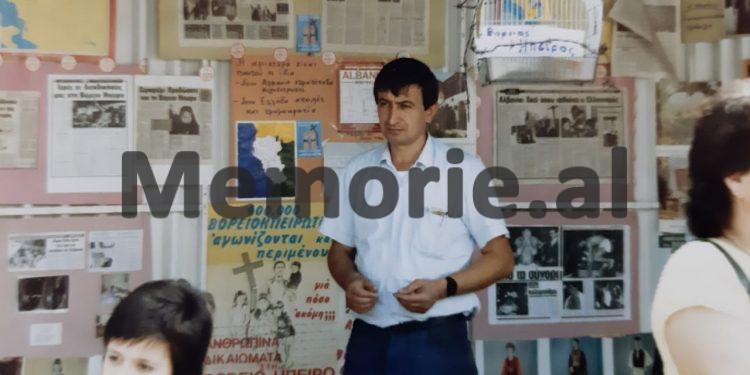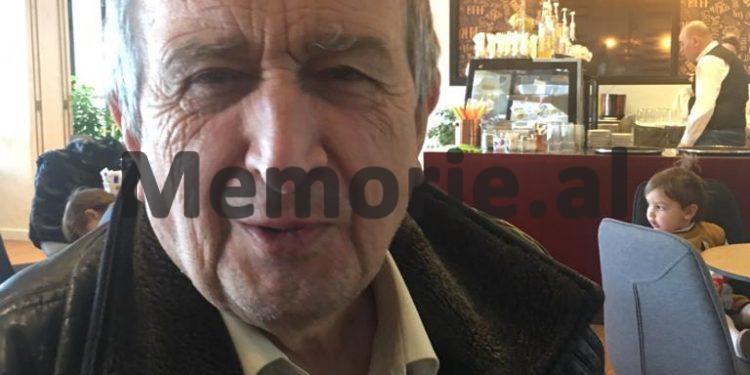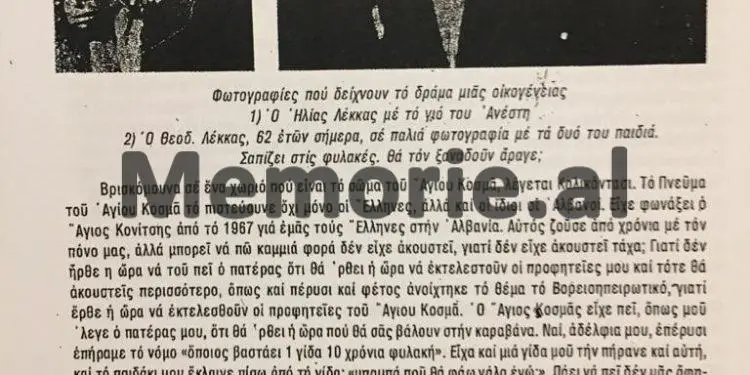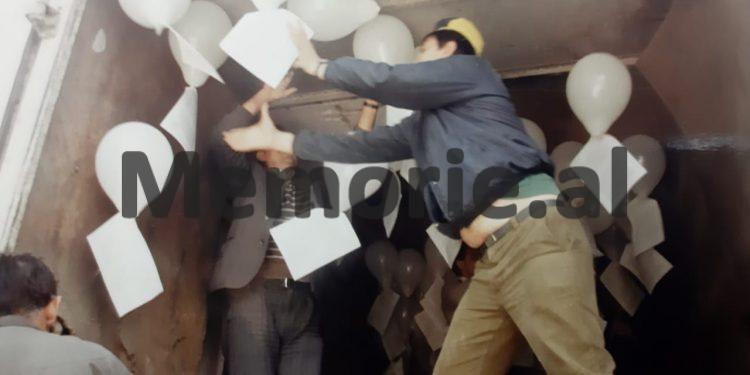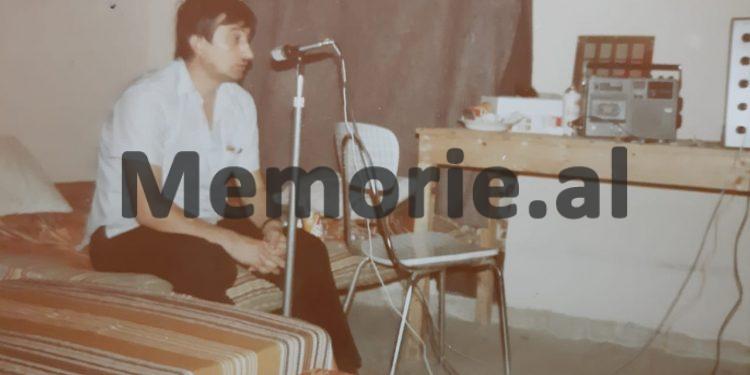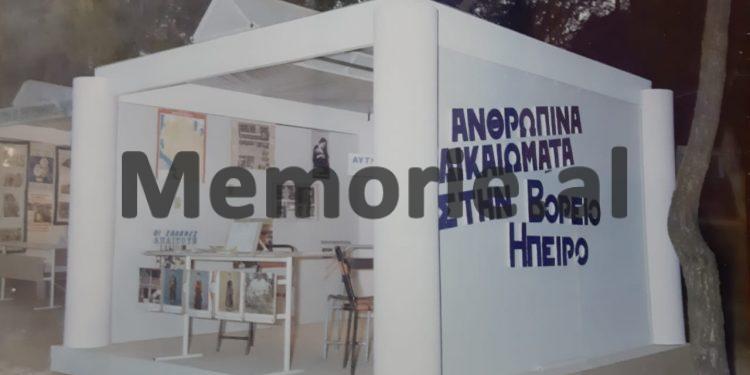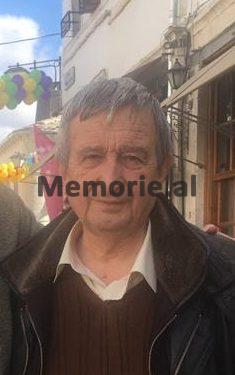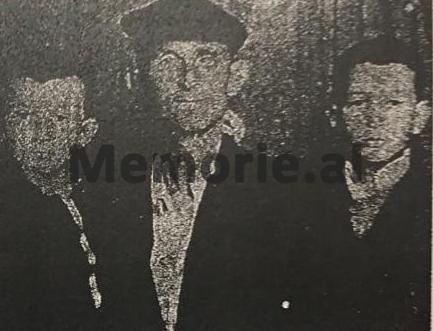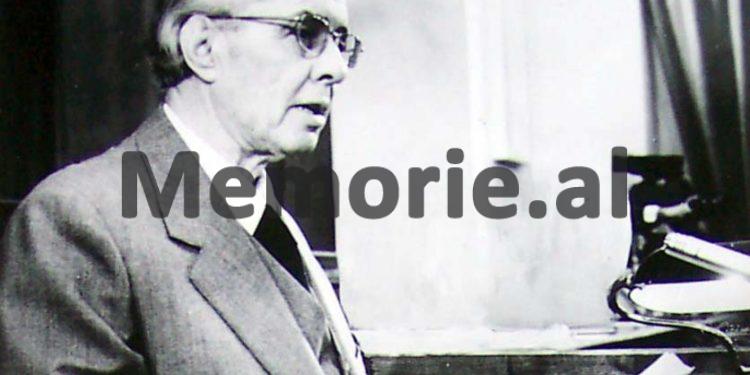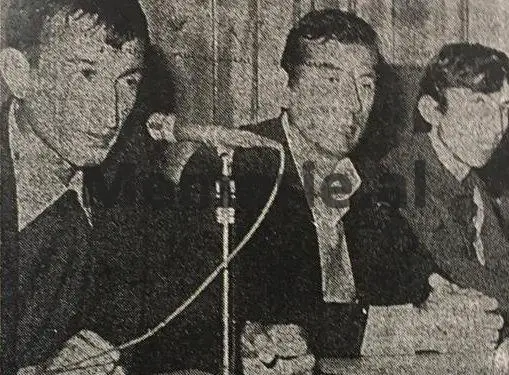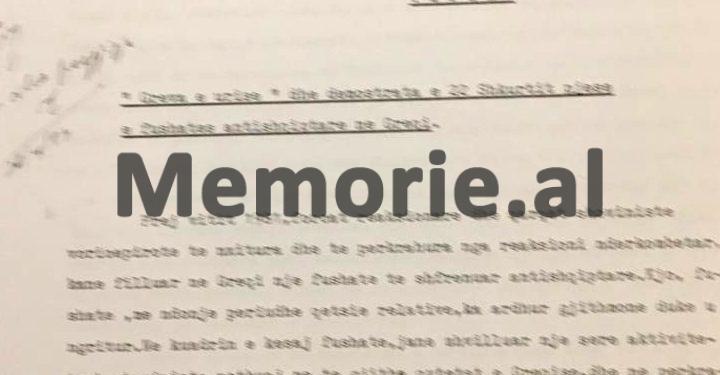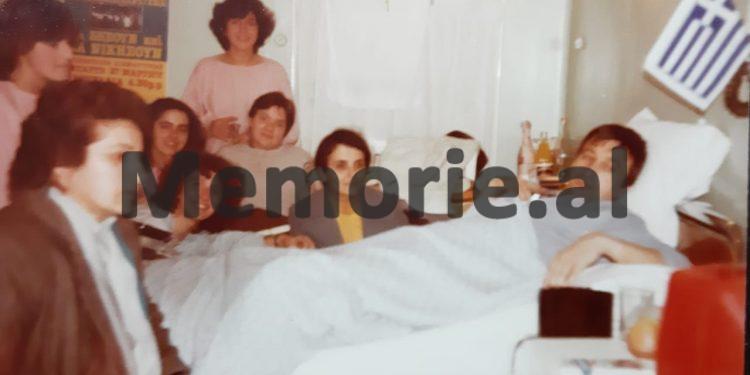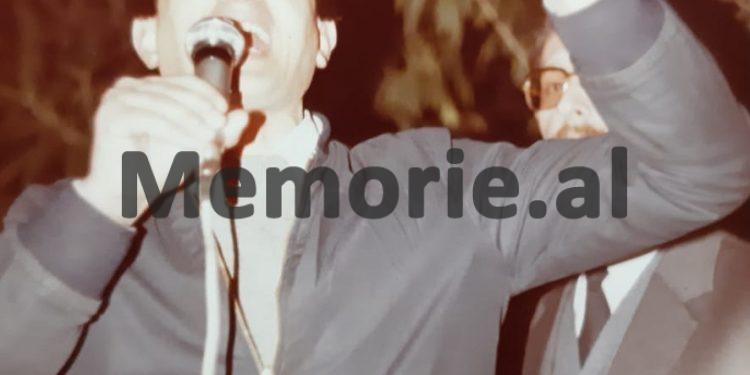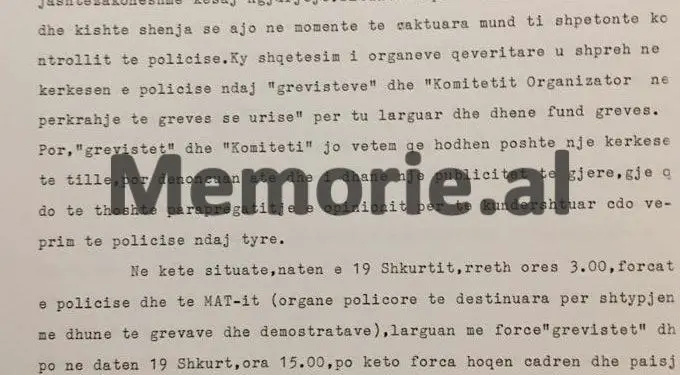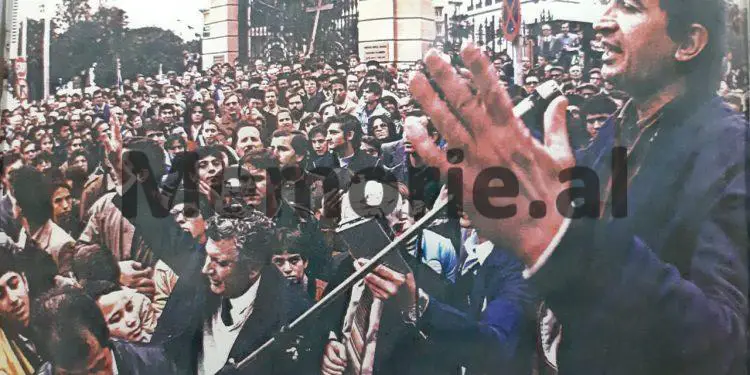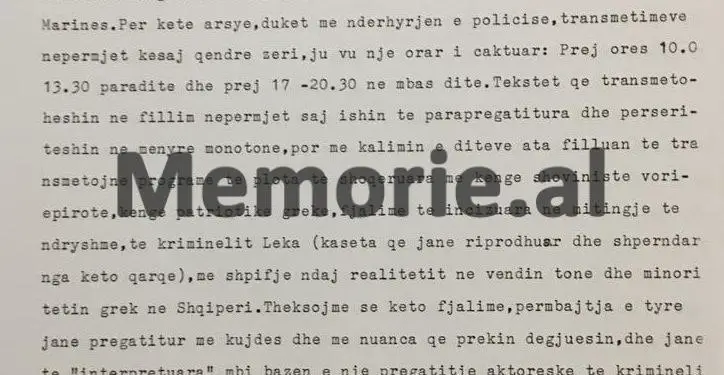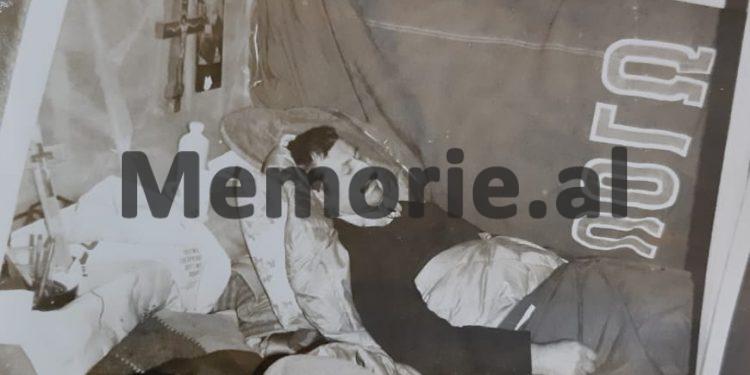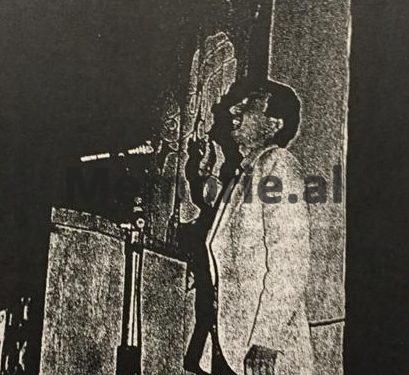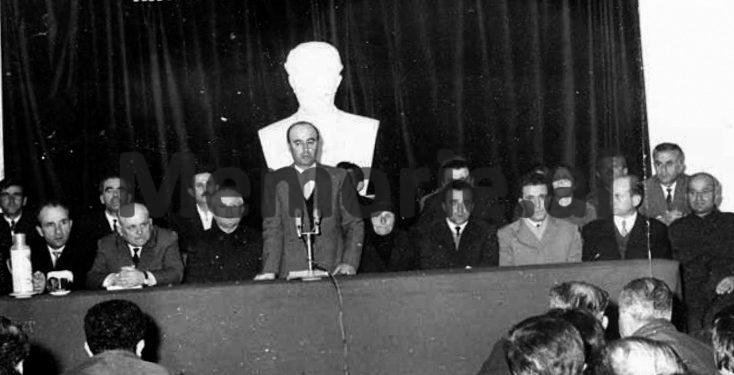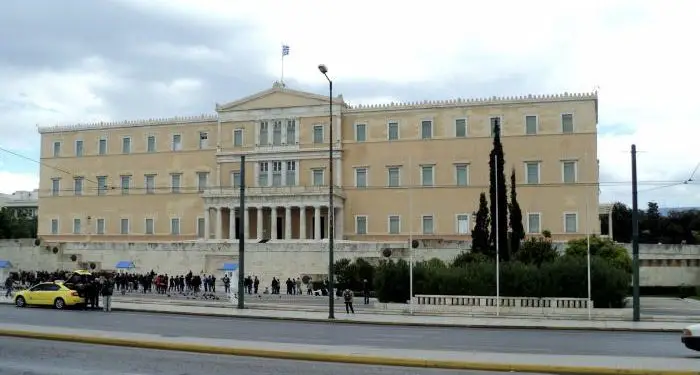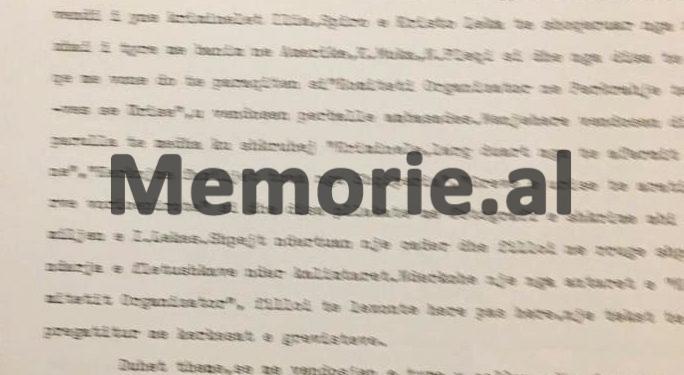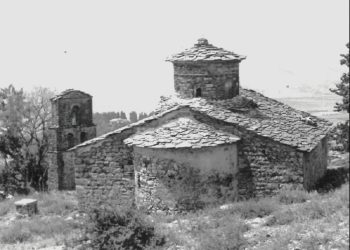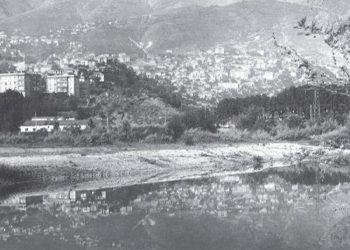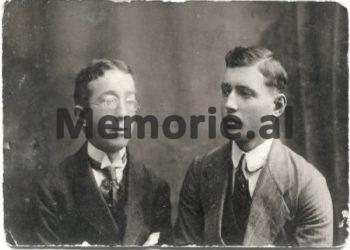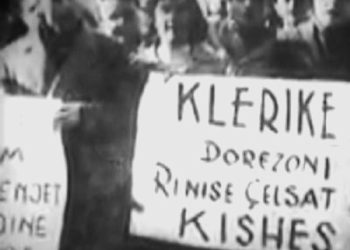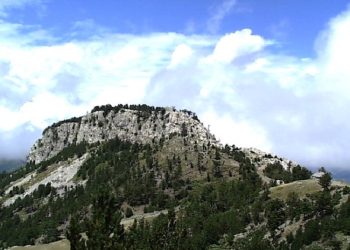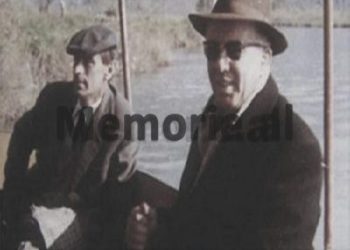Dashnor Kaloçi
Memorie.al publishes some archival documents extracted from the Archive of the Ministry of Foreign Affairs in Tirana and the Information Authority of the Files of the former State Security, which are part of a voluminous file which deals with the rare and unknown history of Ilia Lekë, originally from the village of Glinë in the Greek minority of Gjirokastra, whose family had been living in exile in Myzeqe villages since 1945, and his father, Theodhoriu, had been arrested since 1951 and were serving time in camps and prisons. accused of being a “Greek intelligence agent”.
Attempts by the State Security to recruit Ilian and then arrest him, and Ilias’ escape together with his brother Kriston and their uncle in Greece, where after some threatening letters that Ilia made to Enver Hoxha, Ramiz Alia, and Adil Çarçan, who was asked to get his father out of prison and his wife and son, to allow him to come to Greece, the three of them went on a hunger strike in front of the Albanian embassy in Athens, which lasted until 1984.
The strike sparked major diplomatic tensions between the two countries, as it sensitized not only the Greek parliament and government in Athens but also the Greek press and some ultra-nationalist parties and Vorio-Epiriot chauvinist circles led by Metropolitan Sevastianos, who exploited it. for their interests, as well as Ilia Leka’s speeches in the European Parliament and the American Congress, for the violation of human rights in the communist regime in Albania, until they forced Enver Hoxha to come out and publicly declare: “I say responsibly to the people Greek brother that in the Albanian prisons there are only 46 citizens from the Greek minority and only 4 of them for political crimes ”, as well as Ramiz Alia to release Theodhori Leka from prison in 1989, allowing him to go to Greece forever.
“I was imprisoned without knowing anything. And we were forced to leave to escape from prisons and torture. So much for knowing. Now, as I wrote to you, I am telling you: Allow me, family. Don’t hold my 4-year-old son captive, don’t hold my 63-year-old father in prison by torturing him, don’t make me tell you, do inhumane acts. My father will die, I know, even if you get him out of jail, he doesn’t live more than 6 months. But let me and you and your Government know that my father’s death at the moment I find out, let it be a day at lunch, then you will be convinced of what I will do, but you will say that he made it clear to me on paper. I have told you and I will tell you as men openly. Delivering my family with me to wash the accounts. Then let the Greek government act diplomatically, because my father has been in prisons and internments since 1951. He didn’t see a white day. ”
This is stated, among other things, in a letter personally sent to Enver Hoxha, dated December 25, 1983, authored by an Albanian citizen named Ilia Theodhori Leka, originally from the village of Glinë in Gjirokastra and living in Kolonjë. of Lushnja, where he had lived as a family interned internally from 1945 to April 12, 1982, when he and his brother, Kristo Lekë, and their uncle were forced to flee Albania to Greece.
The letter in question addressed to Enver Hoxha, which is handwritten by the minority Ilia Leka, is an official document and part of a very voluminous file with the initials “Extremely Secret” issued by the Archive of the Ministry of Foreign Affairs of Albania and The Authority for Information of the Files of the former State Security, which is reflected in hundreds of typed or handwritten sheets, the whole story of Ilia Leka and his family.
Starting from the origin of the family from the village of Glina in the Greek minority in the district of Gjirokastra, where in 1945 two sons of the Leka family escaped, their internment in 1951, in the village of Savër in Lushnja and then in some villages of other in that area of Myzeqe, the State Security surveillance of Ilia Leka’s father, Theodhori, who was a shepherd in the hills around the Ardenica Monastery, the reports of State Security collaborators given to the operative Security workers who were following and monitoring Theodhori Lekë, their reports to the top bosses, the combinations and legends made to “dismantle his agency activity”, Theodore’s arrest in 1951, accused of being a “Greek intelligence agent and liaison with several persons and agents who they were fleeing from Albania to Greece and vice versa ”, serving his sentence in several Albanian prison camps , the attempt of the State Security since the 70’s to recruit his son, Ilia Lekë, his rejection and various provocations of the Security collaborators and the people introduced by him, the vicissitudes of Ilias with letters of complaint in high state and party instances or meetings with the heads of the courts and the prosecution, demanding the release of his father from prison as innocent, the arrest of Ilias’ uncle and the torture against him in the Internal Affairs Branch of Vlora, where he was forced to sign a statement about Ilian, as if he had spoken out against “popular power”, Ilias’ escape with his brother Christon and their uncle on April 12, 1982, leaving for Greece through the border villages of their homeland, the threatening letters that Ilia sent from Greece to Enver Hoxha, Ramiz Alia, Hekuran Isa, Adil Çarçan and Reiz Maliles, where he asked them to release his father from prison and stop torturing him, holding his 4-year-old son hostage and pressuring his wife to force him to divorce Ilian and remarry, but allowed them to come to Greece, Ilia Leka’s hunger strike with his brother and uncle in front of the Albanian embassy in Athens that lasted about three years sensitizing the public and Greek politics that made that issue the day of the Greek Parliament and the government of Athens , the commitment of the Athens police to protect the Albanian embassy for fear of Ilia Leka who had set up a tent in front of its main entrance, the secret daily correspondence with urgent telegrams of the Albanian ambassador to Athens, Xenophon Nushi, with the Ministry of Foreign Affairs in Tirana and personally , Enver Hoxha, Ramiz Alia, Adil Çarçanin, Hekuran Isain and Reiz Malile, keeping him informed about everything that was happening there with hunger strikers and Greek politicians and MPs who showed solidarity with the strikers and took part in protest rallies in front of the Albanian embassy, articles in major Greek newspapers regularly covering the event, and the reaction of some nationalist parties and the Metropolitan. Sevastianos urging the Greek government to resolve the issue as soon as possible and “the fate of the 400,000 Greek minorities suffering under Hoxha’s regime”, correspondence between the Albanian and Greek Foreign Ministries regarding the problem of Ilia Leka’s strike, etc, etc.
Along with all these that as we said a little above, are part of a voluminous file which is available in full Memorie. al and I will make it public starting from this article, in the coming days we will also be introduced to an interview Ilia Lekë’s exclusive long-lived family living in Athens, where he testifies to these events containing these archival documents and others that have not been reflected there. Since the hunger strike in front of the Albanian embassy in Athens, which shook the official relations between Albania and Greece and forced Enver Hoxha to come out publicly and declare: Albanians who are part of the Greek minority and only 4 of them are for political guilt “, the Greek press sensitized the strike of Ilia Lekë, who was invited and spoke at the European Parliament in Brussels and at the American Congress in Washington for violating its human rights from the dictatorial communist regime of Enver Hoxha, to the “dismemberment” of official Tirana in 1989, which forced Ilias’ father, Theodhori, to be released from prison and allow him to go to prison forever. Greece to his son, where he lived for many years after the overthrow of the communist regime, rejoicing at the arrival of the rest of the family had remained in Albania.
follows from the previous number
Report-information of the Albanian Embassy in Athens, for the Ministry of Foreign Affairs in Tirana
AMBASSADOR OF R.P.P.S. To Athens on 19.3.1984
ALBANIA
ATHENS
ALBANIA FOREIGN MINISTRY
(3rd Directorate)
Tiranë
“Hunger strike and 22 February demonstration, part of the anti-Albanian campaign”
Since 1981, reactionary forces and chauvinist North Epirus circles, encouraged and supported by the international reaction, have launched an unbridled anti-Albanian campaign in Greece. This campaign, with some period of relative calm, has always been on the rise. As part of this campaign, a series of chauvinist activities have taken place in almost all Greek cities, fascist organizations, and to some extent the “New Democracy”. Despite the various goals pursued by these forces, they have been united in their passionate and chauvinist activity against our country. For their purposes, these forces have also exploited some criminals who fled our country, especially the criminal Ilia Leka, whom they used to speak at chauvinist rallies and provocations against the embassy. Also, the criminal Ilia Leka was used to put pressure on the embassy, through phone calls, provocative letters for meetings, etc. He has been encouraged to send threatening letters to the leaders of our party and state.
Throughout this anti-Albanian campaign, the broadest and most organized activity was the staging of the “Hunger Strike”, which was based on a well-studied plan and provided opportunities for a wide range of propaganda activities and a longer scope. in time.
On February 6, 1984, around 9:30 in the morning, the fugitives from our country, the criminals, Ilia, Spiro, and Kristo Leka, accompanied by their uncle living in America, K. Muka, N. Pleqi, as well as by several others who would later appear as the “Organizing Committee in Support of the Hunger Strike” were placed in front of the embassy. Immediately, they placed some large banners reading: “Criminals, keep your hands off our relatives”, “We are looking for our families from Albania”, “Hunger strike of the fugitive North Epirusians”, as well as some posters with photos and writings on the family of Ilia Lekë. They soon built a tent and began distributing leaflets to passersby. Meanwhile, one of the members of the “Organizing Committee” began to read from time to time, a text prepared with the demands of the strikers.
It should be noted that with their deployment, other police forces were brought in, which notified the Representation of the strike plan to hand over a petition, which shows that the police were fully aware of the “program” for this activity… In fact, the patrol of the embassy had been reinforced by the police for several days, and this was related to an anonymous phone call, according to which “if Metropolitan Sebastianos was killed, the Albanian Embassy would be blown up”. Such a policy measure, especially by the reactionary press, was distorted and presented as one of the “usual machinations of the Albanian embassy”.
Let us stop at this point as this reminds us of the “kidnapping episode” of March 15, 1983, and the publicity given to the press, which aimed to draw the attention of the Greek public and prepare the ground for the events that would follow. This “episode”, we think, preceded the “Hunger Strike”. It is also worth mentioning the visit and activities carried out by the President of QEVA, the Archbishop of the Greek Church, Serafim in Yugoslavia, as well as by the fascist Metropolitan, Sebastiano’s and criminal Ilia Leka in the US, where they received numerous contacts with leaders of panepirio organizations. of the United States and Canada as well as with American congressmen, the Head of the Orthodox Church of Latin America, Jakovo, etc. They also addressed the Human Rights Commission of the US Congress. During this visit, they were given financial means and used to raise the morale of various North American organizations and elements in the North. Insurance was also obtained that US circles interested in the plight of the “400,000 northern Greek-Epiriot Greeks” would provide ongoing financial assistance and support their activities through their connections and channels in Greece and internationally. ”
It was at this time that on February 6, 1984, a new impetus began to be given to the anti-Albanian campaign through the chauvinist forces of the reaction in Greece, in the context of a broad anti-Albanian plan.
Starting from February 7, 1984, and using as a cause the “Hunger Strike”, the reaction forces, and mainly the extreme right forces, such as ENEK, ONNED (its extremist forces), SFEVA, QEVA, the northern-epiriot silhouette, the priests as well as some vagabonds fleeing our country, were feverishly engaged in a vile provocative, propagandistic campaign just a few meters away from the embassy. The strikers’ tent was enlarged, large stands and vile slanderous material were set up against our country, the center of the voice was raised, with two very powerful artillerymen, through whom bitterness would be raised against our country, our leadership, our people and embassy activity staff. We note that very large quantities of printed leaflets were brought and illustrated with the photograph of the family of the criminal Ilia Leka. More than 6-7 people were engaged in this distribution every day, who, taking advantage of the traffic on the road in front of the embassy, distributed significant quantities to every passer-by who drove there. These days, about 10-15 people were standing next to them, changing their clothes, but their presence was constant. The intensity of the megaphones seems to have provoked the reaction of the residents of the area, especially the Navy Hospital. For this reason, it seems that with the intervention of the police, the broadcasts through this voice center, you were given a certain schedule: From 10.00 to 13.30 in the afternoon and from 17-20.30 in the afternoon. The texts that were initially broadcast through it were pre-prepared and repeated in a monotonous way, but over the days they began to broadcast full programs accompanied by northern chauvinist songs, Greek patriotic songs, speeches recorded at various rallies, of the criminal Leka, (tapes have been reproduced and distributed in these counties), with slander against the reality in our country and the Greek minority in Albania. We emphasize that these speeches, their content has been carefully prepared and with nuances that touch the listener, and are “interpreted” based on an acting preparation of the criminal Leka.
We are briefly mentioning some slogans and statements through this voice center. The main place in this call is left to the request “for the return of the families of the fugitive North Epirusians”, which they tried at every moment to present as a human aspect, to which the Greek public opinion is generally quite sensitive. “Every man has the right to be close to his wife, children and family”.”,” Hoxha’s regime has no right to keep Greek families in prisons “,” We demand the release of 25,000 political prisoners. ” 100,000 exiled Greeks return to their homes. Give human rights to the 400,000 Greeks of Northern Epirus, open schools, churches, borders, and so on. Besides, insulting and provocative slogans were thrown at every moment against the leader of our country, issuing insinuations such as “Fascist, dictator, Hitler”, etc. We also talked about our country, characterizing it as “hell”, where together with the Greeks, Albanians are killed and oppressed “. Various insults and insults were also leveled at the embassy, considering its staff “agents and criminals of Hoxha”, and in particular such insinuations were directed against the head of the embassy who was considered “a Greek traitor, renegade, etc.” The departure of the embassy and its head was constantly demanded, and the latter was invited to refute what these vagabonds were saying in the direction of our country.
“Strike” or better to say this carefully staged activity, the organizers tried to turn it into a place of pilgrimage. To this end, the reactionary forces mobilized so that this activity would not be localized with the propaganda in front of the embassy, but would extend it as widely as possible. For this purpose, leaflets were distributed at various key points in Athens, and posters were put up. From this point of view, the distribution of materials and the placement of banners in favor of our country was done by the organization SAQE and OKMLE. From the chauvinist forces special attention was paid to the press. The pages of the Greek reactionary press were made available to them. A math mobilization was demonstrated by the Greek reactionary clergy.
After this group came several other groups, such as that of ENEK (Fascist Organization), that of the monarchists with placards and portraits of Queen Frederica, which consisted mainly of children, that of elders, led by the priest of a church. , as of the Cypriot students, he with the members of the north-epiriot silhouette of Athens, & c. All of these groups did not have a wide participation and in no case did their number exceeds 30 to 70 people.
On February 13, 1984, at 5:30 pm, the first organized demonstration took place, with a much wider turnout than before. About 300-400 people attended the demonstration, which was organized by the fascist priest of the church of Agios, Pandeleimoni. Among them were members of the North Epirusian syllogisms, church believers, priests, members of SFEVA, members of ENEK, etc. as well as deputies of the “New Democracy”, leaders of QEVA, etc. We note as always that the police presence was greater than that of the demonstrators. Speeches were made at the demonstration with the usual slander and nuances by the priests J. Dhiotis, D. Luko, the General Secretary of the QEV J. Caber is and the Secretary of the North Epirus organization of Athens, K. Gjikas, the vagabond Ilia and Spiro Leka, a representative of the “Cypriot refugees”.
It is worth noting in their speeches, especially that of the priest D. Luko, that the “negligent attitude of the PASOK government towards the North Epirus strikers and the fate of the 400,000 Greeks enslaved in the North Epirus” was openly criticized. While Ilia Leka addressed the “indifference” of Archbishop Serafin and asked him “the intervention of the President and the Prime Minister for his fate and that of the northern Epirus brothers in Albania”. The intonation of this rally was given by the members of SFVEA and ENEK, who threw threatening, insulting slogans, etc. Some moments irritated the crowd, but there were no incidents in the direction of the embassy. We note that the announcements for the organization of the demonstration on February 22 were made at the same rally.
After this activity, the “Hunger Strike” continued routinely, while from various sources we learned about the preparations and the feverish efforts for the great demonstration of February 12. It should be noted that the “Previous” have been visited by the deputies of the “New Democracy”, known for their well-known anti-Albanian and chauvinist attitudes, such as Kallojanis, calendars, Stathopullos, Vezdrevanis, Papadopoulos and Hondrokuqis, and Bulukos, etc. Meanwhile, the situation in front of the embassy, which was stimulated by the indifference of the Greek government, became serious because the extremist forces of SFVEA and others carried out provocative actions and aimed to give extraordinary dimensions to this event. The situation often became threatening and signaled that at certain moments he could escape police control. This concern of the government bodies was expressed in the request of the police against the “strikers”, and the “Organizing Committee in support of the hunger strike”, to remove and end the strike. But the “strikers” and the “Committee” not only rejected such a request but also denounced it and gave it broad publicity, which meant preparing the public to oppose any police decision against them.
In this situation, on the night of February 19, at around 3.00, the police and MAT forces (police bodies intended for the violent suppression of strikes and demonstrations), forcibly removed the “strikers” and on February 19, at 15.00, the same forces removed the tent and the equipment that had been placed inside it, etc. Outside it was only banners, some banners, and three Greek flags placed on the trees on the sidewalk of the Navy Hospital (the latter are still there today).
The connections of the reactionary forces seem to be deep, and the information provided by them includes accurate data up to the highest organs of state power. The clearest proof of this is the fact that these forces can learn every action or opinion of the Greek government in terms of relations with Albania and since it has been proven by practice, every move of the government is accompanied by opposition from these forces, which to some extent can be said to have pleased the Greek government to justify the literary state of relations between our two countries. It was thanks to these connections that the decision of the relevant Papandreou government bodies to forcibly remove the “strikers” was learned by the reactionary forces, and at night on February 19, more than 60-70 people stood up to oppose the organs of police for leaving Ilia Lekë. Among them were the priests J. Dhiotis, A. Pandaleimoni, J. Spirodhopulos, etc., as well as the deputies, the former minister of the “New Democracy”, Dh. Nianos and E. Spenzeri, et al. The same scheme was repeated on February 19 when police forces came to remove the tent still in front of the embassy. Again, the same forces gathered in front of her, especially from the “Organizing Committee for the Support of the Strikers”, but there were also some elderly women and old men who chanted and sang chauvinist songs with fanaticism. Leaders of the North Epirus organization of Athens tried to organize a rally but failed. The fact that the strike to remove the “strikers” was given on Sunday, deprived the press of the opportunity to reflect this activity and since there is no press on Monday, the reactions in almost all the morning and afternoon ghettos of Tuesday On February 21, they agreed with A. Papandreou’s visit to Ioannina, on the occasion of the 71st anniversary of the liberation from the Turkish elections, where the Greek Prime Minister will make infamous statements on the alleged “violation of the human rights of Greek Greeks in Albania.”
These statements, which were quite surprising and unexpected, on the one hand caused surprise and indignation in the progressive and objective people as well as the PASOK government itself, on the other hand negatively affected uninformed people and indirectly helped the February 22 demonstration. 1984, in front of our embassy, to receive wide proportions. As we noted above, preparations for this demonstration began to be feverish and intensified immediately after the February 13 demonstration, where such a reactionary and anti-Albanian activity was announced. Of course, it is understandable that such an activity was planned and foreseen in the general scenario of this activity with the staging of the “hunger strike”. But some government crackdowns and Papandreou’s statements prompted his participation in the February 22 demonstration to be far greater than it could have been. But on the other hand, we emphasize that it was very small than the organizers hoped and did not justify the great efforts and preparatory work done by these forces, as well as the colossal expenses made for the propaganda materials that were used both before and after her.
The demonstration in Propilje and the demonstration in front of the embassy on 22.2.1984 were attended by about 6000 people, most of whom are members of ONNED and ENEK, as well as other forces of North-Epirus organizations brought from all over Greece. special tools. Characteristic was the widespread participation of priests. Deputies from the “New Democracy”, Varcivliotis and Sinoidhimu, etc. also took part.
The demonstration began with a large-scale rally in Propilje (the square in front of the University of Athens in the city center and continued from 4.30 pm to 7.30 pm, including the takeover of the rally site via the main boulevard “Vasilisa Sofi”). at our embassy. At the rally, which was characterized by fascist hysteria and ascended by medieval religious processions, the Metropolitan of Konica, Sebastiano’s, Secretary-General of QEVA, spoke. their activity was not directed against the Albanian people ”, could not avoid the fascist, anti-communist and anti-Albanian character, was accompanied by typical fascist actions and incidents of gangsters equipped with sticks, breaking the windows of the Greek TV (ERT-1), beat the journalists and clashed with each other. Meanwhile, at 18.30, in front of the barracks, along with numerous forces of police, people began to gather who did not follow the pickup but came directly in front of the embassy. At 5.30 pm, crowds of participants arrived in front of the embassy, holding dozens of banners, placards, and shouting and chanting slogans. They also carried a large cross where they had chained a girl aged 9-10, another cross covered with a black piece that read “Ja Vorio-epir-Ja die”, a math flag held at corners by many, as well as other Greek and Northern Epirus flags, etc. With artillery, the protesters chanted slogans such as “open the churches”, “release 100.00 internees and 25,000 prisoners”, “this was the place where our brothers were hit”, “Fascist Skullariqi-resign”, “Leka- “Remember, we are with you”, “If the strikers die, the embassy will burn”, “If the strikers die, the embassy will rejoice”, “Nushi remember the origin”, “Long live the North Epirus”, “Freedom to the North Epirusians”, Down with the hands of the strikers “, etc. The crowd was again greeted by the Metropolitan of Konica, Sebastiano’s, who was leading them. After that, the crowd was irritated and with shouts the above slogans started again as well as with slogans “Hoxha killer”, etc. A group in the middle of the crowd, including a former minister and the former driver of the dictator, Papadopoulos, chanted slogans such as “Gangsters, PKG fascists.” Meanwhile, in the direction of the embassy, some small stones were thrown that did not cause any damage, and that was accompanied by the slogan: “Here are the killers”. From a group made up of Metropolitan Sebastinaos, a resolution was placed at the embassy gate. At around 20.30, the crowd moved towards the Evangelismos Hospital, where the two fugitives were staying. This activity was filmed by Tv PRESS, which has done almost all the activities that took place in four frames./Memorie.al




